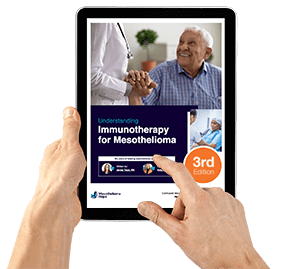Each year, the National Comprehensive Cancer Network (NCCN) updates its guidelines to reflect the latest research and treatment options for various cancers, including mesothelioma.
In March 2025, our Oncology Nurse Navigator Liz Logan attended the NCCN Annual Conference in Orlando, Florida, where the most recent updates to the pleural mesothelioma guidelines were shared.
These latest NCCN guidelines were reviewed in depth during a session led by Dr. James Stevenson of Cleveland Clinic.
Here are 5 important takeaways that patients with pleural mesothelioma should know.
1 . Getting the Right Diagnosis Is Critical
Before starting treatments, it’s critical to confirm the accuracy of your mesothelioma diagnosis and identify the exact cell type.
The 2025 guidelines also stress the importance of:
- Taking tissue samples through a thoracoscopy (a surgical procedure that removes a small piece of tissue to examine it under a microscope for the presence of cancer cells)
- Running molecular tests on the tissue to check for genetic signs of cancer
- Getting care from a multidisciplinary team (doctors from different specialties working together)
The symptoms of mesothelioma can be similar to other common illnesses. This makes it prone to misdiagnosis, which can delay appropriate treatment.
Seeing a mesothelioma specialist improves your chances of getting the correct diagnosis. Use our Free Doctor Match to find top experts near you.
2. Surgery May Not Help Everyone
One of the most significant updates is that surgery does not appear to improve survival when combined with other treatments.

“Surgery should only be considered for patients with early-stage (stage 1) disease that is limited to the pleura (the lining of the lungs) and has no lymph node involvement.”
If surgery is an option, the NCCN’s malignant mesothelioma treatment guidelines recommend pleurectomy/decortication (P/D) over extrapleural pneumonectomy (EPP) because it’s generally safer.
You can talk to your doctor about whether surgery is appropriate based on your stage, cell type, and overall health.
3. Immunotherapy Is Now a First-Line Treatment for Some Patients
Dr. Stevenson discussed the results of the CheckMate 743 clinical trial, which continues to guide how doctors treat pleural mesothelioma after it showed immunotherapy helped patients live longer than chemotherapy alone.
Notably, the 2025 NCCN guidelines state that the use of immunotherapy depends on the patient’s mesothelioma cell type.
The new guidelines recommend:
- Immunotherapy with Opdivo® + Yervoy® as the first-line (initial) treatment for the sarcomatoid and biphasic cell types
- Chemotherapy as the first-line treatment for the epithelioid cell type
Immunotherapy can be used as a second-line (follow-up) treatment for epithelioid mesothelioma patients whose cancer doesn’t respond to first-line chemotherapy.
Download our Free Immunotherapy Guide to learn more about how this treatment works for mesothelioma and get tips to manage common side effects.
4. Radiation Therapy Should Only Be Done at Expert Centers
Radiation therapy is now recommended only in very specific cases and must be done at highly experienced cancer centers.
The updated mesothelioma treatment guidelines state:
- Pleural IMRT (intensity-modulated radiation therapy) is preferred after surgery in select cases.
- IMRT is no longer advised for patients who get an EPP.
- Palliative radiation is still an effective option for symptom relief.
These changes reflect growing evidence that radiation needs to be carefully targeted to avoid harming healthy lung tissue.
5. New Clinical Trials Offer Hope
Dr. Stevenson closed his presentation by highlighting two clinical trials that could lead to future breakthroughs in mesothelioma care:
- The DREAM3R trial is studying whether adding Imfinzi® (a type of immunotherapy drug) to standard chemotherapy helps patients live longer.
- The eVOLVE-meso trial is testing a new drug combination (volrustomig + carboplatin + pemetrexed) against standard treatments like chemotherapy and immunotherapy.
Contact our Patient Advocates today to get matched with clinical trials in your area and get help enrolling if you qualify.
Get Help Navigating Your Mesothelioma Diagnosis
At Mesothelioma Hope, we’re here to help you and your loved ones make informed decisions about diagnosis, treatment, and support.

“My foremost priority is ensuring patients grasp their diagnosis, empowering them to make informed health care decisions.”
Our compassionate team can help you at every step of your mesothelioma journey, offering personalized guidance and a listening ear.
Call us now at (866) 608-8933 or use our Free Doctor Match service to get started.












